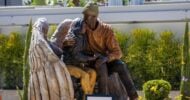It begins with thunder. Not just the kind that splits the sky, but the kind that settles into the chest — low, rolling, remembered. It’s been years since the hurricane, but each crack of lightning still pulls my body into defense. I never used to be afraid of storms. Now, my body remembers before my mind does.
That night, I was post-call. Exhausted, planning to ride out the storm the way most lifelong Floridians do — with boarded windows and borrowed patience. But then came the call: Someone close to me wasn’t speaking clearly. One side of the face slack. Eyes lost focus. Gait unstable. I didn’t have to guess. I’d seen this before — too many times in trauma bays and ICU corridors. This was likely a stroke. And we were in the eye of a Category 3 hurricane.
911 answered. “We’re not sending out responders right now,” they said. “It’s too dangerous. If she stops breathing, call back for CPR instructions.” I stood there, phone still in my hand, storm pounding on the roof, and knew: No help was coming. There was only one option. I grabbed keys. We loaded her into the nearest vehicle — a brand-new electric car that wasn’t mine to use, but it became our lifeboat. One tank of charge. No power. No open roads. No room for error.
The drive was surreal. Street signs ripped from the earth. Branches like spears across the lanes. The wind howled so loud it drowned out my thoughts. Floodwater rose in gutters. I gripped the wheel tighter than I’ve ever held anything, praying — not for safety, but for time. At the emergency department, they stared at us like we had emerged from another world — soaked to the bone, shoes ruined, trembling, but alive. Imaging was done. There was no definitive clot. Radiology was cautious. Neurology was unsure. But I knew the clinical picture: The gaze deviation, the slurred speech, the sudden hemiplegia — all painted a textbook embolic shower. I pushed. Advocated. Pleaded. She was still in the window. Treatment was possible. And it happened.
But as I stood there, watching machines beep and clothes being cut away, I couldn’t stop wondering: What if I wasn’t a doctor? What if I had stayed home like they said? What if I’d waited for certainty? What if I had trusted the system blindly?
What followed were days of chaos. The storm left the city broken. No power. No food. No drinkable water. Hospitals were skeletal, manned by the youngest, the childless, the ones without the option to flee. Senior physicians had vanished. Administrators were quiet. But the work — the endless churn of suffering — didn’t stop. After shifts, I would drive — sometimes over an hour — to check in on the person I’d pulled from the edge. There was no fuel. No functioning gas stations. Just sheer will. We ate in silence, in darkness. I sat guard while she slept, terrified of what might return in the night.
Later, the full story unfolded: Severe atherosclerosis, cardiomyopathy, heart failure. More hospitalizations. Cardiac arrest. I watched as someone I loved fought harder than I thought humanly possible. I saw a body, betrayed by anatomy, still refuse to quit. It wasn’t science. It wasn’t luck. It was something sacred.
But perhaps what broke me most wasn’t the storm, or the stroke, or the silence of leadership — it was the absence. Some family didn’t show. Others avoided updates. A few individuals I had once trusted chose leisure over presence. I heard one say, “She had a good life,” as if preparing for a funeral that hadn’t yet arrived. I remember standing in that gap — between life and death, between apathy and duty — and thinking: This is where the world reveals itself. Some people never came. And others — strangers, nurses, neighbors — appeared without being asked.
- A nurse checked in on her after hours.
- A friend brought bottled water when there was none.
- A colleague covered a shift in silence.
They didn’t have to. But they did. And that quiet loyalty, that invisible grace — I will never forget.
Since then, I don’t look at storms the same. They aren’t just weather events. They’re spiritual sieves. They strip away the performance. They reveal who you are when there’s nothing left but instinct, duty, and time. I no longer assume closeness means support. I no longer wait for apologies from those who disappear. I no longer chase people who withhold presence. That night, and everything after, burned away the illusions.
What was left? Gratitude. Clarity. Conviction. I’m not the same man. I walk more quietly now. I carry a deeper appreciation for life, for people who show up without fanfare, for a human body that refuses to surrender. For something greater — a force beyond logic — that made the impossible possible that night.
Yes, I still flinch at thunder. Yes, I still carry the ache. But I also carry a truth I didn’t have before: Love is measured in presence. Courage is found in stillness. And storms, for all their violence, sometimes uncover the parts of us worth saving.
If I could offer anything to those still navigating their own disasters, it would be this: When the winds rise and the lights go out — don’t wait. Don’t look around to see who’s watching. Run toward the storm. There, you’ll find out who you really are. And if you’re lucky, someone else’s life might depend on it.
Dharam Persaud-Sharma is an anesthesiologist and interventional pain physician.























![AI censorship threatens the lifeline of caregiver support [PODCAST]](https://kevinmd.com/wp-content/uploads/Design-2-190x100.jpg)
